Wonderful waste Class 5 Worksheet English Marigold
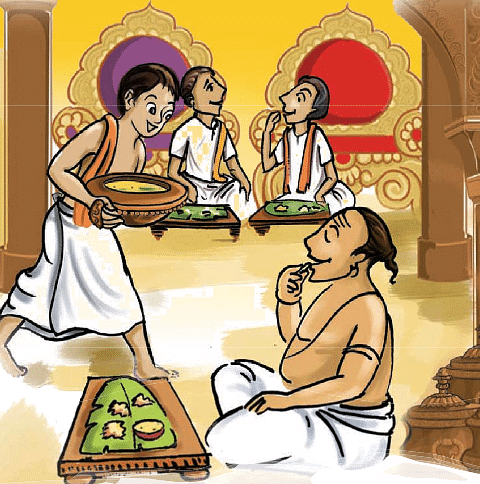 Q1: Multiple Choice Questions (MCQs)
Q1: Multiple Choice Questions (MCQs)
(i) What did the Maharaja of Travancore order in his palace?
(a) A grand party
(b) A feast dinner
(c) A dance performance
(d) A cooking competition
Ans: (b)
The story mentions that the Maharaja of Travancore ordered a grand dinner in his palace.
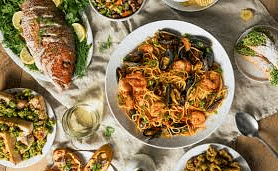 (ii) What did the cook initially plan to do with the vegetable scraps?
(ii) What did the cook initially plan to do with the vegetable scraps?
(a) Make a new dish
(b) Throw them away
(c) Feed them to animals
(d) Compost them
Ans: (b)
The cook initially planned to throw the vegetable scraps away as waste.
(iii) How did the cook come up with the idea for a new dish?
(a) The Maharaja suggested it
(b) He saw a recipe book
(c) He observed the ingredients
(d) He asked the guests for suggestions
Ans: (c)
The cook observed the vegetable scraps and came up with the idea to use them to create a new dish.
(iv) What did the cook add to the cooking vegetables to create a tempting smell?
(a) Fresh coconut oil
(b) Tomato sauce
(c) A mixture of coconut, green chillies, and garlic
(d) Mustard and cumin seeds
Ans: (c)
he cook ground fresh coconut, green chillies, and garlic together and added this paste to the cooking vegetables.
(v) What was the name of the new dish created by the cook?
(a) Veggie Delight
(b) Maharaja's Surprise
(c) Avial
(d) Coconut Magic
Ans: (c)
The cook named the new dish "Avial," and it became famous in Kerala.
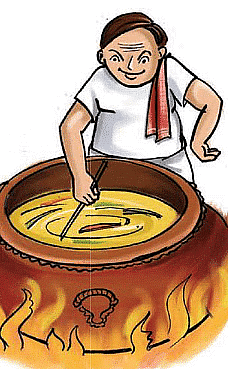
Q2: True or False
(i) The Maharaja ordered a grand dinner in his palace.
(a) True
(b) False
Ans: (a) True
The king of Travancore was organizing a feast in his palace, which led to the cook being busy with preparations. Therefore, the statement is true.
(ii) The cook initially planned to throw away the vegetable scraps.
(a) True
(b) False
Ans: (a)
The vegetable scraps were originally treated as waste and placed in a basket to be discarded. The Maharaja noticed this and ordered the cook to find a way to use them, indicating the cook's initial intention was to throw them away.
(iii) The cook added a mixture of coconut, green chillies, and garlic to the cooking vegetables.
(a) True
(b) False
Ans: (a)
The passage clearly states that the cook ground fresh coconut, green chillies, and garlic into a paste and added it to the cooking vegetables. Therefore, the statement is true.
(iv) The Maharaja named the new dish "Coconut Magic."
(a) True
(b) False
Ans: (b)
The cook named the new dish "Avial," not "Coconut Magic." Avial went on to become a popular dish in Kerala, as mentioned in the story.
(v) The new dish "Avial" became famous all over India.
(a) True
(b) False
Ans: (b)
This statement is false. The new dish Avial became famous all over Kerala, not all over India.
Q3: Jumbled Words
(i) ivaal
(ii) afste
(iii) ytenlsr
(iv) lbegevtea
(v) lieichl
Ans:
(i) ivaal - avial
(ii) afste - feast
(iii) ytenlsr - sternly
(iv) lbegevtea - vegetable
(v) lieichl - chillies
Q4: Word Meanings
(i) Scraps
Ans. Thrown away or unused pieces of something.
Scraps are leftover bits or fragments that are often discarded because they are considered waste.
(ii) Feast
Ans. A large meal, typically in celebration or on special occasions.
A feast is a grand and festive meal, usually held for special events or to celebrate something.
(iii) Coconut
Ans. A tropical fruit with a hard shell and edible white flesh.
A coconut is a large, round fruit with a hard outer shell and contains edible white flesh and coconut water.
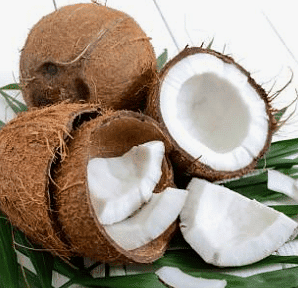
(iv) Curd
Ans. A creamy dairy product often used in cooking or eaten as a snack.
Curd is a dairy product made from fermented milk. It has a creamy texture and is commonly used in cooking or consumed as a snack.
(v) Decorate
Ans. To add embellishments or adornments to something.
Decorating involves adding ornaments or enhancing the appearance of something to make it more attractive or appealing.
Q5: Synonyms
(i) Commanded
Ans: Ordered
Commanded and ordered are synonyms, both indicating someone directing others to do something.
(ii) Eager
Ans: Enthusiastic
Eager and enthusiastic both convey a sense of excitement or eagerness towards something.
(iii) Traditional
Ans: Conventional
Traditional and conventional both refer to something that is customary or commonly practiced.
(iv) Wonderful
Ans: Marvelous
Wonderful and marvelous both describe something that is amazing, remarkable, or awe-inspiring.
(v) Tempting
Ans: Alluring
Tempting and alluring both suggest something that is enticing or attractive, making it difficult to resist.
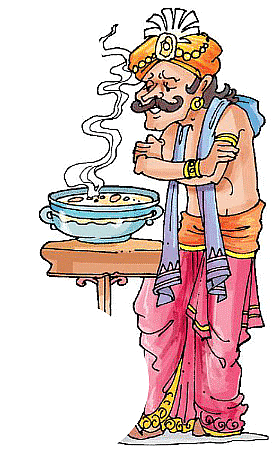
Q6: Antonyms
(i) Fresh
Ans: Stale
Fresh and stale are antonyms. Fresh refers to something new or recently produced, while stale indicates something old or no longer fresh.
(ii) Throw
Ans: Retrieve
Throw and retrieve are antonyms. To throw is to propel something away from oneself, while to retrieve is to bring something back.
(iii) Success
Ans: Failure
Success and failure are antonyms. Success refers to achieving a positive outcome, whereas failure is the lack of success or an unsuccessful result.
(iv) Start
Ans: Finish
Start and finish are antonyms. To start is to commence or begin something, while to finish is to complete or conclude it.
(v) Dirty
Ans: Clean
Dirty and clean are antonyms. Dirty describes something unclean or soiled, whereas clean refers to something free from dirt or impurities.
Q7: Short Answer Questions
(i) Who ordered the grand dinner in his palace?
Ans: The maharaja of Travancore ordered a grand dinner in his palace.
(ii) Why did Maharaja enter the Kitchen?
Ans: The Maharaja entered the kitchen to survey the dishes that had been prepared for the feast.
(iii) Which kind of smell started coming from the pot.
Ans: A tempting smell started coming from the pot.
(iv) Express your views what did he do with the vegetable bits?
Ans: The cook had decided to throw away the vegetable bits, but when the king came, he ordered the cook to use those bits and not waste them. So, the cook thought of a new dish and made it from those vegetable scraps. The vegetable bits were not wasted.
(v) When we waste food, which value we ignore?
Ans: When we waste food we don't think of the ones who are homeless and don't have even a single piece of food to eat. The food we throw away may be useful for someone who doesn't have it. By wasting food, we ignore the value of food as well as money.
(vi) What were the preparations in the palace for?
Ans: There were the preparations for a grand dinner in the palace.
(vii) Why did the maharaja go in the kitchen in the afternoon?
Ans: Maharaja entered the kitchen to survey the dishes that had been prepared for the feast.
(viii) Why was the cook staring at the vegetable scraps?
Ans: He was staring at the vegetable scraps so that an idea could flash into his mind for using the vegetable scraps.
(ix) How was the taste of new dish? By whom was it named?
Ans: The new dish was so wonderful in taste that everyone was eager to know the name of the new dish and it was named by the cook as avail.
(x) “You cannot waste all these bits and pieces of vegetables. Find a way to use them.” Who said this to whom?
Ans: Maharaja had commanded the cook.
|
22 videos|156 docs|67 tests
|
FAQs on Wonderful waste Class 5 Worksheet English Marigold
| 1. What are the main types of waste discussed in "Wonderful Waste"? |  |
| 2. How can we reduce waste in our daily lives according to the article? |  |
| 3. What are some innovative uses for waste materials mentioned in the article? |  |
| 4. Why is it important to manage waste effectively as per the article? |  |
| 5. What role do individuals play in waste management according to "Wonderful Waste"? |  |

















